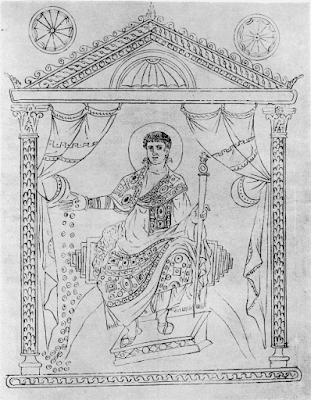It is a terrible irony that, days after the tragic suicide of Aaron Swartz, JSTOR for the first time made articles from its catalog of academic journals available to the general public, at least on a limited basis. In brief, members of the public not affiliated with colleges and universities (as I am not) can now go to the JSTOR site, fill out a form and obtain a user name and password that allows them to search for and store articles on a personal “bookshelf” without charge. Access is limited in that you can store only up to three articles on your “bookshelf”, and each article must remain there for thirteen days. In other words, you can access no more than three articles over a two-week period. In addition, you cannot download articles without paying a ridiculous per-article fee. (I do note that, since the pages appear as GIF images, it should be possible to download images page-by-page without paying a fee.)
Having heard that JSTOR was now available, I promptly signed up and, as a test, located an article I had previously complained I was unable to access: Why Didn’t Constantius II Eat Fruit? Having done so, I now report on what I have learned.
By way of background, in his obituary of the emperor Constantius II, the Roman historian Ammianus Marcellinus oddly mentions that one of the late emperor’s virtues was “that so long as he lived he never ate fruit.” Why on earth not? And why would Ammianus consider this to be a virtue? In my prior post, I admitted that I was stumped and expressed frustration at my inability to read the article, which appeared to squarely address the issue.
I am pleased to report that my confusion was well founded. The author of the article, one David Rohrbacher of the New College of Florida, offers, as we shall see, an answer that is ingenious but obscure and based on a chain tenuous inferences. I certainly didn't miss anything obvious.
Prof. Rohrbacher begins by eliminating possibilities suggested by other academics. Was the reference intended to highlight, for example, Constantius’ lack of gluttony? Not likely. After reviewing the literature the author concludes that “complete abstinence from fruit would be a most unusual way of demonstrating a lack of gluttony.”
Nor does Christian asceticism seem to be a likely source. Even extreme ascetics who abstained from certain foods (meat and wine are the most common) ate fruit when available and in season. There is no reason to think that Constantius was trying to out-renounce them.
“There was, however, [one] contemporary religion in which fruit-eating was problematic: Manichaeism.” As Prof. Rohrbacher describes it, Manichees apparently believed that plucking fruit injured the divinity within them. “In fact, fruit, vegetables, and grains were all forbidden to be plucked or harvested by the Manichean Elect, because Mani had preached that harvesting was injurious to the suffering, captive divinity.” Whatever the details of Manichaean practice, pro-Nicene Christians such as Augustine “frequently mock[ed] . . . Manichean opponents for abstaining from fruit.”
But what has this to do with Constantius, who was an Arian Christian, but no Manichee? Prof. Rohrbacher asserts that, however unfairly, orthodox anti-Arian Christians such as Athanasius associated the two beliefs, accusing Arians of being Manichees or suggesting that Arianism leads to Manichaeism. Based upon this association, Rohrbacher speculates that unpreserved “polemics written against the emperor’s Arianism [may] likewise have associated him with Manichaeism, and with the more extravagant practices, such as fruit abstinence, associated with that sect.”
Ammianus Marcellinus, a pagan, may have seen or heard of some of these polemics and, “from ignorance or guile or a combination of the two,” conflated Constantius’ Arianism with Mancheaism. Out of dislike for the emperor, he then catalogued the fruit-abstention slur as a purported virtue to highlight the “pleasing irony” of using “Christian lies to blacken a Christian emperor.”




No comments:
Post a Comment